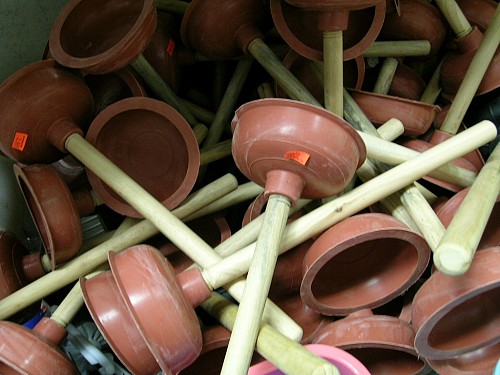Emergency Plumbing Repair Toolkit
Funny how it always happens on the weekend or after 10 pm – your plumbing goes haywire. Suddenly that leaky faucet turns into a torrent, or the slow-moving toilet overflows, or … (fill in the blank with your own tale of woe). The good news is: If you're prepared with the right tools, you’ll be able to tackle a DIY emergency plumbing repair and save money on a service call, or at least put it off till a more reasonable -- and less expensive -- hour.
Find out what you need to stock a well-equipped emergency plumbing repair toolkit.
Bucket. A simple bucket is an invaluable plumbing tool. Use it to hold bailing water (below) or to capture any spillage when you remove a sink’s p-trap for cleaning. It can also flush your toilet in a pinch when the valve isn’t working; fill the pail with water, raise the toilet seat, and pour the water straight into your toilet in one smooth motion. You could even improvise an emergency shower – standing in the tub, simply douse yourself with a bucketful of water. Lather and rinse.
Bailer. When you’re faced with an overflowing toilet, your first impulse is likely to be running away plunging the heck out of it. Not so fast. You might actually be better off bailing out some of the excess water first. That way, you’ll clear the field, minimizing overflow and possibly allowing you to spot what’s causing the clog in the first place.
Plunger. When you’re ready to attack your stopped-up plumbing with a plunger, make sure you have the right one for the job. A toilet clog requires a plunger with a flange, which creates a tight seal in the fixture’s curved innards. Keep a separate small standard-style plunger on hand in case of a kitchen sink blockage.
Snake. A plumbing snake, also called an auger, is a metal coil with an attached handle, used to clear clogged drains that don’t respond to your most energetic plunging. Push a manual or electric snake (the latter fits onto your electric drill) carefully down into the drain to break up the blockage.
Rubber gloves. Not to be too indelicate, but some emergencies are caused by stuff that gets stuck in your plumbing. If you ever need to reach into the toilet, say, for a disposable diaper which shouldn’t have been disposed of in quite that way, you’ll really, really appreciate a protective pair of rubber gloves.
Rags. The humble household rag is actually a very useful item to include in your emergency plumbing repair toolkit. It’s invaluable for sopping up watery messes, whether applied post-mess or before you start on a potentially messy task, such as cleaning the p-trap.
Mineral oil. Occasionally, a disused basement floor drain starts giving off an aroma best described as “Eau de Sewer,” indicating that the water which is normally supposed to be in the trap has dried up. Deodorize the stinky drain by pouring in half a bucket of H2O, topped off with 2 tablespoons of mineral oil to slow down evaporation. If the smell persists, contact a licensed plumber.
Water-stop sealant. If you’ve ever had a busted pipe, a cracked plumbing joint, or a leak in your cement, you know they can turn your house into a disaster zone in less time than it takes to shout, “Where’s a plumber near me?” Prevent damage to your home and belongings -- patch leaks up temporarily with a sealant like plumbing epoxy or mastic.
Vinegar and baking soda. Want some “preventive medicine” to help avoid the need for emergency plumbing repair? Use baking soda and vinegar as natural drain cleaners to keep your drains flowing freely and smelling fresh.
A reliable plumbing service. The very best “tool” for a plumbing emergency is a good relationship with a reliable plumbing service. When you move into a new neighborhood, look for a licensed plumber in your area to handle routine plumbing needs. When you find a pro you like, put their number on speed dial for the day you need emergency plumbing repair.
Laura Firszt writes for networx.com.
Looking for a Pro? Call us (866) 441-6648

Average Costs
Related Experiences

Watch Out For Contractor Red Flags

Our Wooden Deck Refinishing: No More Splinters!




